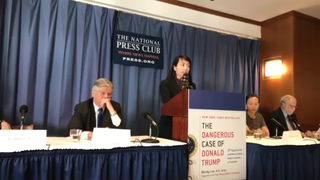
Health
Mental Health Experts Speak of an Increasingly Dangerous Era
Authors of ‘The Dangerous Case of Donald Trump’ warn of greater dangers ahead.
Posted May 14, 2018

On May 1, 2018, at the opening of Mental Health Awareness Month, five authors of The Dangerous Case of Donald Trump: 27 Psychiatrists and Mental Health Experts Assess a President gathered at the National Press Club (Herbst, 2018) to discuss the dangers they wrote about exactly one year earlier, in the wake of an ethics conference at Yale that questioned: “Does Professional Responsibility Include a Duty to Warn?” Now, not only has much of what they have warned about come true, the participants believe the country is facing increasing dangers as the situation continues to evolve and the public grows weary of ever-worsening symptoms. While the scale and the setting may be different from their usual practice, the signs we are seeing are not new to mental health professionals who are offering themselves as consultants.
On the panel were Dr. Bandy Lee, a forensic psychiatrist at Yale School of Medicine who edited The Dangerous Case of Donald Trump; Dr. James Gilligan from Harvard Medical School and Cambridge University; Dr. Edwin Fisher from the University of North Carolina-Chapel Hill; Ms. Betty Teng from the Institute for Contemporary Psychotherapy in New York City; and Dr. Michael Tansey, a private practitioner from Chicago. Also involved in the event were Dr. Thomas Singer of San Francisco, Dr. Judith Herman of Harvard Medical School, and Dr. Robert Jay Lifton of Columbia University.
They presented at the start of Mental Health Awareness Month as a small sample of the 27 mental health experts who contributed to the book, who were in turn only a fraction of the numerous health professionals who have come forth, for the first time in U.S. history, with concerns about a presidency, regardless of political party. Thousands of them have joined together and formed the National Coalition of Concerned Mental Health Experts (dangerouscase.org).
They noted that if we were to republish the book today, we might consider updating the title to The Increasingly Dangerous Case of Donald Trump, due to serious, ongoing observations and concerns. There is, first, the danger that his mental instability poses as a result of the power that he holds and the weapons he has at his disposal.
But there are also the effects on public health caused by his fomenting of violence. Hate crimes have seen unprecedented spikes (PBS News Hour, 2017), and white supremacist killings have doubled (Werner, 2018). There are statistics revealing that 39 percent of Americans feel more anxious now than they did a year ago (Kaplan, 2018). The president is also destabilizing the global scene by alienating allies through a trade war (Noack, 2018), emboldening despots by declaring “fake news” (Kruzel, 2018), and recreating a culture of nuclear proliferation (Economist, 2018) in ways that are predictable from his mental impairments. These are not just matters of policy but arise out of a troubled relationship with reality, a propensity to attack if questioned or even slightly criticized, and dangerous behavioral patterns that need to be spoken about.
Dr. Gilligan clarified that, from a psychiatric standpoint, the most important and relevant consideration about Donald Trump is not whether he’s mentally ill or not, but whether he is dangerous. Even if he meets the diagnostic criteria for one or more mental disorders, that alone does not prove that he is dangerous. Our responsibility as psychiatrists is to warn the public when we have reason to believe that a public figure is indeed dangerous, for he will represent harm to public health, whether or not he is mentally ill.
Dr. Fisher had predicted that his narcissistic concerns for self and preoccupation with power may initially shape and limit those invited into the president’s network. The more he selects for those who flatter and avoid confrontation, and the more those who have affronted him and been castigated fall away, the most powerful man in the world would come to sit nearly alone in the White House. Social isolation and loneliness are as deadly as cigarette smoking, exacerbate stress and distress, and are now becoming the most dangerous characteristic of Donald Trump’s presidency.
Ms. Teng noted that we are in an unprecedented era where it is not mental health that intrudes upon the realm of politics, but politics that distorts our society’s mental health. Through her lens of trauma treatment, she sees the impact of Donald Trump’s harmful behavior on two social levels: In the micro or one-on-one sphere, there is that which retraumatizes her sexual trauma survivors. In the macro or societal sphere, his harm is in his negligence of our national security through his belligerent language and behavior toward political adversaries, both foreign and domestic.
Dr. Tansey realized, during Donald Trump’s CIA speech—when he insisted the “fake news” media had fabricated his feud with intelligence community, that God stopped the rain for his speech, and that his crowd was packed all the way to the Washington Monument—that these were not strategic lies but delusional falsehoods. They only made him appear foolish to those paying close attention. With Trump believing delusional falsehoods and having unfettered access to the nuclear codes, there is simply no limit to his potential dangerousness: We are not as afraid as we should be.
The book, The Dangerous Case of Donald Trump, is meant to be a public service. Much of what is unfolding in national life can be overwhelming for those without the language or experience of dealing with psychological issues on a daily basis. Special knowledge and training are what mental health experts can bring—from their clinical, objective, professional perspective, without any partisan or political agenda—to observations of events. Their ultimate goal is to create an informed public regarding mental health issues, so that people can protect their own health and make life-affirming choices rather than destructive ones.
Note: A recording of the event can be viewed here: https://www.youtube.com/watch?v=qPasc6lQGFQ&t=413s
References
Economist (2018). A farewell to arms control. Economist. Retrievable at: https://www.economist.com/news/briefing/21741537-politics-and-technolog…
Herbst, D. (2018). Top psychiatrists gather to warn that Donald Trump ‘represents a danger to public health.’ People. Retrievable at: http://people.com/politics/psychiatrists-warn-donald-trump-danger-publi…
Kaplan, K. (2018). It’s not just you, we’re all living in the United States of Anxiety. Los Angeles Times. Retrievable at: http://www.latimes.com/science/sciencenow/la-sci-sn-americans-more-anxi…
Kruzel, J. (2018). Donald Trump’s ‘fake news’ epithet emboldens despots around the world. Politifact. Retrievable at: http://www.politifact.com/truth-o-meter/statements/2018/jan/22/jeff-fla…
Noack, R. (2018). How Trump risked a trade war with China and alienated U.S. allies in less than 30 days. Washington Post. Retrievable at: https://www.washingtonpost.com/news/worldviews/wp/2018/04/06/how-trump-…
PBS News Hour (2017). Post-election spike in hate crimes persists in 2017. PBS News Hour. Retrievable at: https://www.pbs.org/newshour/show/post-election-spike-hate-crimes-persi…
Werner, K. (2018). White supremacists committed most extremist killings in 2017, ADL says. NBC News. Retrievable at: https://www.nbcnews.com/news/us-news/white-supremacists-committed-most-…



